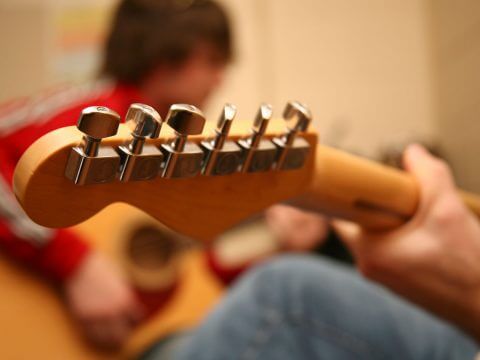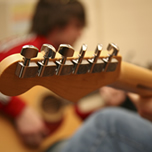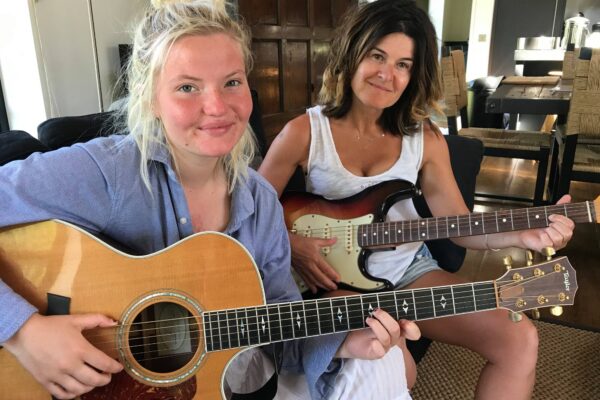
Tips & Tricks
Tips & Tricks for improving as a Guitarist
DAWs & Loop Pedals
Digital Audio Workstations (DAWs) have revolutionized the music industry and made it easier than ever for guitar players to create, record, and produce their music. With a simple interface, musicians can access a vast library of sounds and effects that allow them to create professional-quality music right from the comfort of their own homes.
DAWs
A DAW is a powerful tool that can greatly improve your practice regime by providing you with a vast array of guitar tones, drum beats, and other backing tracks to play along with. Furthermore, it can help you develop new musical skills and increase your creativity. With practice, you can learn how to layer instruments, program drum parts, and even mix your own music in real-time.
Additionally, a DAW offers an impressive level of versatility that makes it ideal for live performance. Once you’ve crafted your music within the DAW, you can take it on the road and play it live, using the interface as your control center. This allows you to bring your carefully crafted music to life and deliver it to your audience in real-time.
There are many free DAW options available, and while they provide a great starting point, a purchase of a professional-level DAW is a sound investment. With the right software and a little practice, you’ll be amazed at how quickly you can develop your music technology skills and create amazing music with ease.
If you’re looking to improve your guitar playing and expand your creative horizons, consider incorporating a DAW into your practice routine. With the vast array of sounds and effects, the ability to record and produce music, and the versatility to perform live, a DAW is a tool that every guitar player should have in their arsenal.
Guitar Backing Tracks
The use of backing tracks is often viewed as a controversial topic in the world of music, with many musicians and guitarists looking down on those who use them. However, this negative perception is far from the truth, and the use of backing tracks should not be overlooked by anyone looking to improve their skills as a musician.
Backing tracks provide an excellent opportunity to build confidence, perfect technique, and improve theory knowledge and improvisational skills. They offer a solid foundation for musicians to build upon, allowing them to focus on their own playing without the need to rely on other musicians. The convenience of backing tracks cannot be overstated. Instead of having to spend hours searching for recordings to practice with, guitarists can now easily find what they want to play over with just a few clicks.
Backing Tracks
Moreover, backing tracks can also be used to enhance live performances. With the addition of loop pedals and other instruments, the possibilities are endless. Musicians can create multi-dimensional and engaging sets that push their live performances to new heights. With the use of a Digital Audio Workstation and loop pedal, it’s possible to create your own backing tracks for practice or performance use.
However, it’s important to note that the use of backing tracks does not diminish the need for musical ability. On the contrary, it can make you a better musician by forcing you to focus on your playing and musical knowledge. The use of backing tracks should never be considered as cheating, as it takes musical ability, creativity, and technical knowledge to create engaging performances with them.
Backing tracks are an excellent tool for guitarists and musicians to improve their skills and build their confidence. Whether you use them for practice or live performances, the use of backing tracks is a fantastic way to play music on your own and create new possibilities in your musical journey. Don’t overlook the value of backing tracks in your musical journey, they can be the key to unlocking new doors and taking your playing to the next level.
Loop pedals
Loop pedals are an essential tool for any guitar player who wants to take their playing to the next level. Whether you’re just starting out or you’re a seasoned pro, incorporating a loop pedal into your practice routine can help you improve your rhythm, timing, and overall confidence. There are many different loop pedals available, ranging from simple one-button models to complex multi-channel desk units. Regardless of which one you choose, the key to getting the most out of your loop pedal is to start simple and build from there.
Looper pedals
One of the biggest advantages of using a loop pedal is that it enables you to build whole song structures on your own. This is an incredibly valuable skill, as it will help you understand your strengths and weaknesses as a musician, and also help you develop your creative abilities. Whether you’re practicing your strumming, trying to create new melodies, or just experimenting with different chord progressions, a loop pedal can be a great tool for helping you build your skills.
When you’re just starting out, it’s best to go with a no-nonsense, one-button loop pedal with plenty of recording time. This will help you get the hang of how the pedal works and how you interact with it. Once you’ve got the basics down, you can move on to more advanced models, like two-button loopers or multi-channel units. The more advanced models will allow you to get creative and introduce other instruments into your playing, such as vocals, bass, keyboards, and percussion.
Aside from being an excellent practice tool, loop pedals are also a lot of fun. Whether you’re practicing your strumming and rhythmic precision, trying to create new melodies and harmonies, or just crafting whole songs from scratch, a loop pedal is a great way to get creative and keep your playing fresh and exciting.
When you’re looking to take your playing to the next level, a loop pedal is an essential tool that no guitarist should be without. Whether you’re just starting out or you’re a seasoned pro, incorporating a loop pedal into your practice routine can help you improve your rhythm, timing, and overall confidence, and make you a better musician in the long run.







